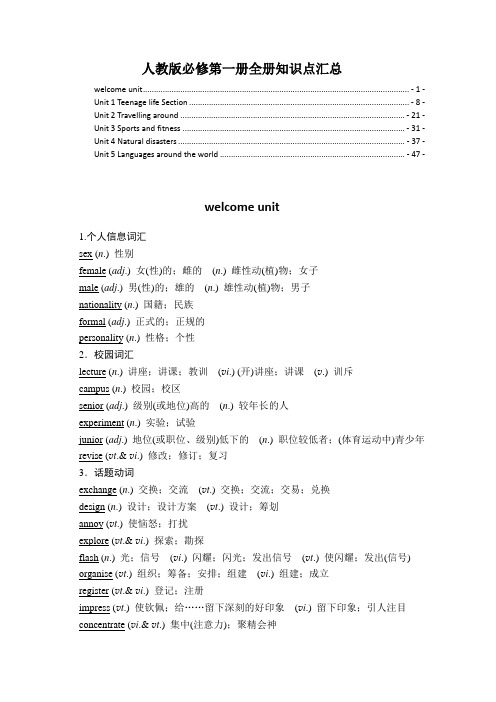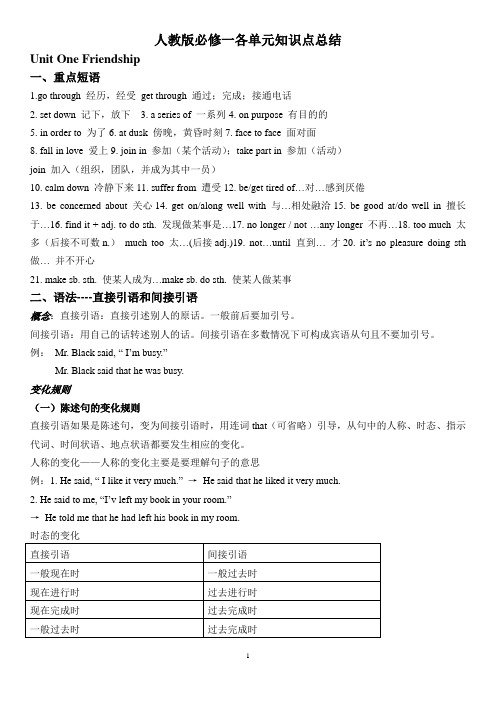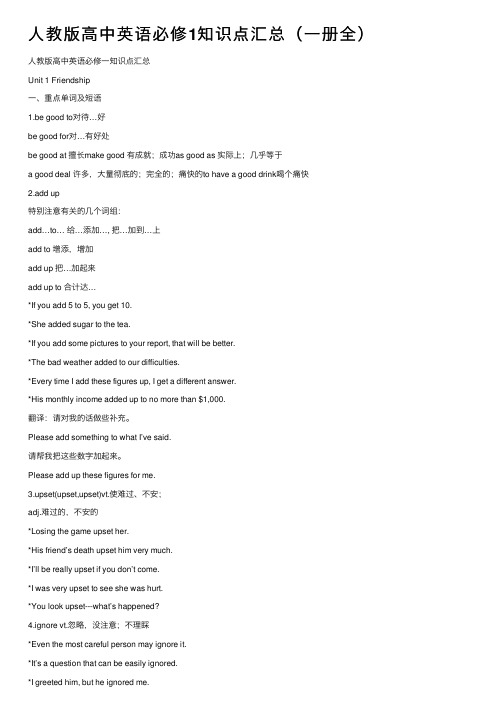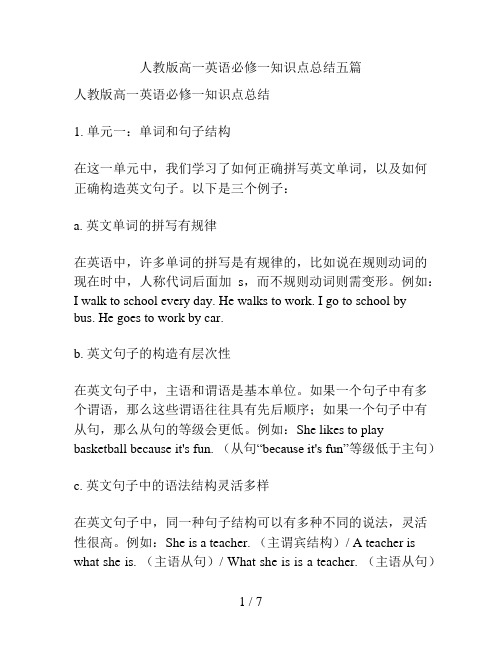高中英语人教版必修一知识点总结
人教版高一英语必背知识点总结梳理5篇

人教版高一英语必背知识点总结梳理5篇高中阶段学习难度、强度、容量加大,学习负担及压力明显加重,不能再依赖初中时期老师“填鸭式”的授课,“看管式”的自习,“命令式”的作业,要逐步培养自己主动获取知识、巩固知识的能力,制定学习计划,养成自主学习的好习惯。
下面就是小编给大家带来的人教版高一英语知识点总结,希望能帮助到大家!人教版高一英语知识点总结1一、一般过去将来时1.概念:立足于过去某一时刻,从过去看将来,常用于宾语从句中。
2.时间状语:The next day (morning, year…),the following month(week…),etc.3.基本结构:主语+was/were +going to + do+其它;主语+would/should + do+其它4.否定形式:主语+was/were+not + going to + do; 主语+would/should + not + do.5.一般疑问句:was或were放于句首;would/should 提到句首。
6.例句:He said he would go to Beijing the next day.他说他第二天要去北京。
I asked who was going there.我问,谁要去那里。
二、现在进行时1.概念:表示现阶段或说话时正在进行的动作及行为。
2.时间状语:Now, at this time, days, etc. look. listen3.基本结构:主语+be +doing +其它4.否定形式:主语+be +not +doing+其它5.一般疑问句:把be动词放于句首。
6.例句:How are you feeling today?你今天感觉如何?He is doing well in his lessons.在课上他表现得很好。
人教版高一英语知识点总结2as 可作关系代词,引导定语从句。
1.asas可以在限制性定语从句和非限制性定语从句中作主语或宾语。
新人教版高一英语必修一知识点复习整理

新人教版高一英语必修一知识点复习整理1. 语法知识点
- 介词的用法
- 表示时间、地点和方式等
- 注意介词和动词的搭配
- 冠词的用法
- 不定冠词a和an的用法
- 定冠词the的用法
- 名词的单复数形式
- 一般名词的复数形式
- 不规则名词的复数形式
2. 词汇知识点
- 常用动词短语
- 与各种情境相关的常用动词短语
- 包括表示喜欢、讨厌、担心、希望等意思的动词短语
- 常用形容词及副词
- 描述人、事物特征的常用形容词
- 表示时间、程度、方式等的常用副词- 高频词汇
- 重点掌握高频出现的单词和常用短语3. 阅读技巧
- 预测文意
- 根据上下文预测单词或句子的意思
- 联系上下文理解文章
- 通过上下文的线索来理解全文意思
- 抓住文中关键信息
- 注意文章中的重点句子,理解文章主旨4. 写作技巧
- 语法正确性
- 注意动词时态和主谓一致
- 尽量避免语法错误
- 结构完整性
- 确保文章有开头、主体和结尾
- 逻辑连贯性
- 使用适当的连接词
- 使用连接词使句子和句子之间衔接紧密
以上是《新人教版高一英语必修一》的知识点复习整理,希望对你的学习有所帮助。
新教材 人教版高中英语必修第一册全册各单元知识点提炼汇总(单词短语语法写作等)

人教版必修第一册全册知识点汇总welcome unit ......................................................................................................................... - 1 - Unit 1 Teenage life Section .................................................................................................... - 8 - Unit 2 Travelling around ...................................................................................................... - 21 - Unit 3 Sports and fitness ..................................................................................................... - 31 - Unit 4 Natural disasters ....................................................................................................... - 37 - Unit 5 Languages around the world .................................................................................... - 47 -welcome unit1.个人信息词汇sex (n.) 性别female (adj.) 女(性)的;雌的(n.) 雌性动(植)物;女子male (adj.) 男(性)的;雄的(n.) 雄性动(植)物;男子nationality (n.) 国籍;民族formal (adj.) 正式的;正规的personality (n.) 性格;个性2.校园词汇lecture (n.) 讲座;讲课;教训(v i.) (开)讲座;讲课(v.) 训斥campus (n.) 校园;校区senior (adj.) 级别(或地位)高的(n.) 较年长的人experiment (n.) 实验;试验junior (adj.) 地位(或职位、级别)低下的(n.) 职位较低者;(体育运动中)青少年revise (v t.& v i.) 修改;修订;复习3.话题动词exchange (n.) 交换;交流(v t.) 交换;交流;交易;兑换design (n.) 设计;设计方案(v t.) 设计;筹划annoy (v t.) 使恼怒;打扰explore (v t.& v i.) 探索;勘探flash (n.) 光;信号(v i.) 闪耀;闪光;发出信号(v t.) 使闪耀;发出(信号) organise (v t.) 组织;筹备;安排;组建(v i.) 组建;成立register (v t.& v i.) 登记;注册impress (v t.) 使钦佩;给……留下深刻的好印象(v i.) 留下印象;引人注目concentrate (v i.& v t.) 集中(注意力);聚精会神improve (v i.& v t.) 改进;改善4.话题描述性词汇anxious (adj.) 焦虑的;不安的annoyed (adj.) 恼怒的;生气的frightened (adj.) 惊吓的;害怕的outgoing (adj.) 爱交际的;外向的awkward (adj.) 令人尴尬的;难对付的confident (adj.) 自信的;有把握的curious (adj.) 好奇的;求知欲强的forward (ad v.) (also forwards) 向前;前进(adj.) 向前的;前进的5.话题名词registration (n.) 登记;注册;挂号nation (n.) 国家;民族;国民designer (n.) 设计者impression (n.) 印象;感想confidence (n.) 信心;信任guy (n.) 小伙子;男人;家伙organisation (n.) 组织;团体;机构goal (n.) 目标;球门;射门strategy (n.) 策略;策划partner (n.) 同伴;配偶;合伙人company (n.) 公司;商行;陪伴style (n.) 方式;作风6.话题短语senior_high_school 〈美〉高中at_last 终于;最终make_an_impression 留下好印象what_if 要是……会怎么样呢concentrate_on 集中精力于leave ... alone 不打扰;不惊动junior_high_school 〈美〉初级中学look_forward_to 盼望,期待take_notes 记笔记flash_card 教学卡片;识字卡重点知识合作探究Our school invited two engineers to design_a_language_lab_for_us.我们学校邀请了两位工程师为我们设计一个语言实验室。
人教版高一英语必修一知识点总结

人教版高一英语必修一知识点总结人教版高一英语必修一知识点总结(一)1.preferPrefer doing …to doing…Prefer to do rather than do2.advantages /disadvantages 优势/劣势2.Ever since middle school, my sister Wang Wei and I have dreamed about taking a great bike trip. 从高中起,我姐姐王维和我就一直梦想做一次伟大的自行车旅行。
连词since 引导的时间状语从句用一般过去时,介词since 与时间点连用It is/has been+一段时间+since+一般过去时自从……至今已经多久了。
3. persuade sb to do sth= persuade sb into doing sth 说服某人做某事4. 强调句型 It is/was+被强调部分+that/who强调句型可以强调除谓语动词以外的任何句子成份。
一般来说,如果被强调部分是人时,用连词that或who;如果被强调部分是物,只能用连词that。
not … until 的强调句5.be fond of 喜欢,喜爱6. Although 尽管,虽然,引导让步状语从句① although 从句多在句首, though 从句可在主句前、中、后任何位置,而且though 可以作副词用于句末,作“但是,不过”讲,而although 无此用法。
② as though(仿佛,好像),even though(即使,尽管)中不能用although。
③ though 引导的让步状语从句可以倒装(将表语、状语、情态动词后的动词原形前置到句首,此用法同as),而 although 不可以。
7. insist on doing sth/ sth. 一定要、坚持主张She insists on getting up early and playing her radio loudly.她老是一大早起来把收音机音量开大11.care about 关心在乎care for 喜欢,照料,照顾12.change ones mind 改变主意13. experience 经历/经验14. Once 可作为从属连词,作“一(旦)……就……”解,连接一个表示时间的状语从句。
(完整版)人教版高中英语必修一语法知识点总结

人教版必修一各单元知识点总结Unit One Friendship一、重点短语1.go through 经历,经受get through 通过;完成;接通电话2. set down 记下,放下3. a series of 一系列4. on purpose 有目的的5. in order to 为了6. at dusk 傍晚,黄昏时刻7. face to face 面对面8. fall in love 爱上9. join in 参加(某个活动);take part in 参加(活动)join 加入(组织,团队,并成为其中一员)10. calm down 冷静下来11. suffer from 遭受12. be/get tired of…对…感到厌倦13. be concerned about 关心14. get on/along well with 与…相处融洽15. be good at/do well in 擅长于…16. find it + adj. to do sth. 发现做某事是…17. no longer / not …any longer 不再…18. too much 太多(后接不可数n.)much too 太…(后接adj.)19. not…until 直到…才20. it’s no pleasure doing sth 做…并不开心21. make sb. sth. 使某人成为…make sb. do sth. 使某人做某事二、语法----直接引语和间接引语概念:直接引语:直接引述别人的原话。
一般前后要加引号。
间接引语:用自己的话转述别人的话。
间接引语在多数情况下可构成宾语从句且不要加引号。
例:Mr. Black said, “ I’m busy.”Mr. Black said that he was busy.变化规则(一)陈述句的变化规则直接引语如果是陈述句,变为间接引语时,用连词that(可省略)引导,从句中的人称、时态、指示代词、时间状语、地点状语都要发生相应的变化。
人教版高中英语必修1知识点汇总(一册全)

⼈教版⾼中英语必修1知识点汇总(⼀册全)⼈教版⾼中英语必修⼀知识点汇总Unit 1 Friendship⼀、重点单词及短语1.be good to对待…好be good for对…有好处be good at 擅长make good 有成就;成功as good as 实际上;⼏乎等于a good deal 许多,⼤量彻底的;完全的;痛快的to have a good drink喝个痛快2.add up特别注意有关的⼏个词组:add…to… 给…添加…, 把…加到…上add to 增添,增加add up 把…加起来add up to 合计达…*If you add 5 to 5, you get 10.*She added sugar to the tea.*If you add some pictures to your report, that will be better.*The bad weather added to our difficulties.*Every time I add these figures up, I get a different answer.*His monthly income added up to no more than $1,000.翻译:请对我的话做些补充。
Please add something to what I’ve said.请帮我把这些数字加起来。
Please add up these figures for me.3.upset(upset,upset)vt.使难过、不安;adj.难过的,不安的*Losing the game upset her.*His friend’s death upset him very much.*I’ll be really upset if you don’t come.*I was very upset to see she was hurt.*You look upset---what’s happened?4.ignore vt.忽略,没注意;不理睬*Even the most careful person may ignore it.*It’s a question that can be easily ignored.*I greeted him, but he ignored me.5.calm adj.平静的,镇静的;风平浪静的vt.使平静*After the storm, the sea was calm again.*Keep calm in time of danger.*Don’t be nervous; calm yourself, please.calm down平静下来*I told him to calm down.6.concern vt.关系到,和…有关;使关⼼*This matter concerns all of us.*I’m not concerned with this matter again.be concerned about关⼼…;为…担⼼*Please don’t be concerned about me.7.go through 经历,经受;审阅,检查*Most families went through a lot during the war. *I can’t go through these letters in an hour.8. “make her diary her best friend”“call my friend Kitty”make和call都能以名词作宾语补⾜语,即make+sb./sth.+n. 使某⼈/某物成为…call+sb./sth.+n. 称某⼈/某物为…*We must try to make our country a strong one.*All work and no play makes Jack a dull boy.*We called messenger msn in short.*What do you call it?9.everything to do with naturesomething/anything/everything/nothing to do with 与…有关/⽆关*What he is doing has nothing to do with his work.10.far too much实在太多too much(+n.)太多(…), 超过某⼈的能⼒far/much too+adj./adv.实在太…too much homeworkThe work is too much for a boy like him.It’s (much/far) too hot todaymuch/ far too much实在太多11.suffer vi.受苦,受痛苦,受损失vt.受到,遭受*He suffered terribly when his mother died.*He looked pale, and seemed to have suffered a lot/a great deal. *We suffered a set-back/no pain. suffer from遭受,患(病)*I suffered much from lack of rest.suffer from cold/cancer12.recover vt.恢复vi.痊愈*She recovered her health.*Amy is recovering from a severe illness.*He is unlikely to recover.13.get tired of对…开始感到厌烦(表动作)be tired of对…感到厌烦(表状态)14.get along with和…相处;进展*They get along quite well with each other.*How are you getting along with your classmates?*How are you getting along with your English?*I’m getting along well with my study.15.exactly adv.确切地;正是;说的对*You must tell me exactly what you’re doing?*That’s exactly what I want.*It looks exactly like an elephant’s leg.*Exactly!(=That’s right.)16.grateful adj.感激的*I’m very grateful to you for your advice.=Thank you very much for your advice.17.joinA.参加,加⼊(成为其中的成员)*He joined the army/the Party 3 years ago.*He is too young to join the club.B.join sb.和某⼈⼀起(从事某活动)*Will you join us for dinner?*I’ll join you later.*May I join you in the game?C.join in参加某活动(=take part in)*A lot of newcomers joined in the discussion.*May I join in the game?⼆、重点句型1. Do you want a friend whom you could tell everything to, like your deepest feelings and thoughts?2. I wonder if it’s because I haven’t been able to be outdoors for so long that I’ve grown so crazy about everything to do with nature.3. I can well remember that there was a time when a deep blue sky, the song of the birds, moonlight and flowers could never have kept me spellbound.4. It’s no pleasure looking through these any longer because nature is one thing that really must be experienced.5. It/This/That is the first /second…time that+现在完成时“某⼈第⼀/⼆次做……”eg. It is the first time that I have been to the airport.It/This/That was the first / second…timethat+过去完成时eg. It was the second time that I had seen him.三、语法语法----直接引语和间接引语概念:直接引语:直接引述别⼈的原话。
人教版高一英语必修一知识点总结五篇

人教版高一英语必修一知识点总结五篇人教版高一英语必修一知识点总结1. 单元一:单词和句子结构在这一单元中,我们学习了如何正确拼写英文单词,以及如何正确构造英文句子。
以下是三个例子:a. 英文单词的拼写有规律在英语中,许多单词的拼写是有规律的,比如说在规则动词的现在时中,人称代词后面加s,而不规则动词则需变形。
例如:I walk to school every day. He walks to work. I go to school by bus. He goes to work by car.b. 英文句子的构造有层次性在英文句子中,主语和谓语是基本单位。
如果一个句子中有多个谓语,那么这些谓语往往具有先后顺序;如果一个句子中有从句,那么从句的等级会更低。
例如:She likes to play basketball because it's fun. (从句“because it's fun”等级低于主句)c. 英文句子中的语法结构灵活多样在英文句子中,同一种句子结构可以有多种不同的说法,灵活性很高。
例如:She is a teacher. (主谓宾结构)/ A teacher is what she is. (主语从句)/ What she is is a teacher. (主语从句)2. 单元二:课文阅读在这一单元中,我们学习了如何正确理解英文课文的内容,并提高了对英文阅读的兴趣和能力。
以下是三个例子:a. 英文课文中的语言运用丰富多样英文课文中的语言运用很丰富,包括比喻、暗示、转喻等等,需要我们认真阅读并理解。
例如:The sky was a bright shade of blue. (比喻)/ Her words cut him like a knife. (转喻)b. 英文课文中的句式多种多样英文课文中的句式也很多样,有短句和长句、简单句和复合句等等。
我们需要慢慢地理解它们,并掌握如何从中获取信息。
高中英语(新人教版)必修一知识点归纳

高中英语必修一知识点归纳Welcome Unit知识点归纳Part one Vocabulary1. exchange n.交换;交流vt.交换;交流;交易;兑换In exchange (for...)作为(与......的)交换exchange student 交换生exchange A for B 以A交换B:把A兑换成B exchange sth. with sb. 与某人交流/交换某物exchange opinions/ideas/views交流意见/想法/看法2. design1) n. 设计;图案;构思;打算,意图。
make designs for 为......做设计by design(=on purpose)故意地2) vt.设计,构思;计划;意欲。
design sth. for... 为...设计某物be designed to do... 旨在做...,用于做...3. anxious adj. 焦虑的;不安的be anxious for sb./ about sth. 为某人/某事担心be anxious for...渴望...be anxious (for sb.) to do sth. 渴望(某人)做某事be anxious that... 渴望...4. annoyed adj. 恼怒的;生气的be annoyed with sb.生某人的气be annoyed at/about sth.因某事生气be annoyed to do做...感到生气5. senior adj. 级别(或地位)高的n. 较年长的人senior high (school)高中be senior to sb. 比某人的地位/职位高6. impress vt. 使钦佩;给……留下深刻的好印象vi. 留下印象;引人注目have a(n) ...impression of... 对······有······印象leave/make a(n) ...impression on sb. 给某人留下······印象(be) under the impression that... 以为······,(通常指)误认为······7. concentrate on 集中精力于8. leave...alone 不打扰,不惊动9. explore vt.& vi. 探索;勘探exploration n. 探索,探测explorer n. 探险者;勘探者;考察者10. confident adj. 自信的;有把握的be confident about 对......有信心be confident of (doing) sth.对(做)······有把握be confident that... 确信······11. look forward to 盼望;期待12. organise vt. 组织;筹备;安排;组建vi. 组建;成立organisation n. 组织;团体;机构Part two Grammar句子成分和基本句型一、句子成分构成句子的各个部分叫作句子成分。
- 1、下载文档前请自行甄别文档内容的完整性,平台不提供额外的编辑、内容补充、找答案等附加服务。
- 2、"仅部分预览"的文档,不可在线预览部分如存在完整性等问题,可反馈申请退款(可完整预览的文档不适用该条件!)。
- 3、如文档侵犯您的权益,请联系客服反馈,我们会尽快为您处理(人工客服工作时间:9:00-18:30)。
高中英语人教版必修一知识点总结Unit 1 FriendshipUnit 2 English around the worldUnit 3 Tracel journalUnit 4 EarthquakesUnit 5 Nelson Mandela - a modern hero第一单元1)add vt/vi加;添加;增添add up合计加起来,但在口语中有时用于否定句,表示“莫名其妙,不说明问题”。
add up to 总计共达,所有一切都说明,总而言之。
add sth(to sth)把……加到……里去。
add to 增加,扩建。
add 表示“继续说,补充说”。
区别add和increaseadd意思是“加,增加”,强调添加。
或者表示将数字加起来求和。
i ncrease“增加”,表示在数量,产量,尺寸,程度等方面的增加。
2)cheat v 欺骗;作弊n 骗子;作弊者;骗人的事cheat sb of sth cheat sth out of sb 从某人处欺诈某物cheat on/at/in 作弊,欺诈3)list v 将事物列于表上;编事物的目录n 名单;目录;一览表make a list of 造表,列……表take…off the list 从表上去掉……stand first on the list 居首位,列前茅as listed above 如上所列3)shareshare in 分享,分担,共用share sth with sb 和某人共用/共享某事物share out 分配,分发;得到股息,升股息share(n.)in/of 一分,部分4)trust vi/vt 信任,信赖;依赖trust in 相信,信任,信仰trust to 依靠(运气等),依赖trust that… 希望,想5)suffer vt/vi 遭受,受到,蒙受;受痛苦,受折磨,受惩罚,受损伤suffer from 受……伤害;患……病痛注意:suffer 和suffer from 都不能用于被动语态6)calm vt/vi/adj. 使平静;使镇定。
平静的,镇静的,沉着的。
calm down 平静下来,镇定下来quite指人对外界事物感触的安静。
对人时,侧重不激动,平静温和,不发表意见。
still指完全没有声音或者没有动静,突然静止不动。
silent主要指人不爱说话,沉默不语。
7)concernbe concerned about 担心,关心as/so far as…be concerned 关于,至于,就某人而言have no concern for 毫不关心concern oneself in/with/about sth 忙于,从事;关心,关切have a concern in 和……有厉害关系be concerned in/with 参与,与……有关8)separate v/adj 分开,和……分手;单独的,分开的,不同的separate…from 使……和……分离9)reasonlose one’s reason 失去理智,发狂by reason of 由于bring sb to reason 说服某人理智些within reason 合理without reason 不合理listen to reason 听从道理reason sb into/out of sth 以理说服某人做/不做某事10)powerbeyond /out of one’s power 力所不及的,不能胜任的=not within one’s powerin power 当权的,握有政权的come into power掌权,得势11)habitform / make a habit of doing=make it a habit to do sth 养成做某事的习惯be in the habit of 有……的习惯fall/get into a habit of 沾染(养成)……习惯break(off)a habit=get out a habit 戒除一种习惯form good habits 养成良好的习out of habit 出于习惯12)according to为介词短语,后跟名词,代词,不能很从句,表示“根据;按照;试……而定”。
according to其后引出的信息应来自别人或者别处,不能来自说话者自己。
according to其后不能跟opinion,view等名词。
according as 相当于连词,后跟从句,意为“正像,根据,按照,如果”。
13)join in区别join;join in;take part in;attendjoin 参加某个组织或者团体(党派,军队等)<ps:这些名词前面要加定冠词>,并且成为其中的一员。
join in 参加正在进行着的活动,如游戏,讨论,辩论,谈话等。
take part in 参加会议或者群众性的活动,并且在其中法会一定的作用。
attend 参加会议、仪式、婚礼、葬礼、上课、上学、听报告等。
重在强调“参与”的动作,不强调参加者的作用。
14)dare作实意动词有人称和数的变化,也有时态的变化;作情态动词,用于否定句,疑问句和条件句中,有时态的变化,但是没有人称和数的变化。
①在肯定据中的dare,dares,dared之后,不定式一遍加to。
②在否定句中和疑问句中的dare之后,不定时一般不加to。
③在用do或者does构成的否定句和疑问句中,理论上虽然应该有to,实际使用却经常把to省略。
I dare say…我敢打赌说……15)go through 经历;经受;通过考试;经过;审阅;检查go with 伴随,与……协调go up 上升;建起;上涨go over检查,审查;复习,重温go out 熄灭;公布;播出go ahead 进行,进展;(with)赞同go into从事,参加(某一行业);调查16)get along with 同……相处;进展get away 离开;逃避get back 回来;拿回get down 拿下;写下get in 进入;收获get down to 开始认真做…… get on/off 上/下车get over 克服;战胜get across 被理解get through 完成;通过;接通电话get up 起床get it 明白,理解;猜中17)with复合结构,也可以叫做独立主格结构,在格式上没有谓语动词,在句中常作状语,表示伴随,原因,方式,条件等。
①with+名词+介词短语。
在句中作状语,作后置定语。
②with+名词/代词+过去分词。
其中过去分词表示被动或者完成了的动作。
③with+名词/代词+现在分词。
其中现在分词表示主动或者正在进行的动作。
④with+名词/代词+不定式。
其中不定式表示将要发生的动作。
⑤with+名词/代词+形容词。
18)no longer=not…any longer 表示不再继续或者再现过去某一时刻发生或存在而一直延续的动作/状态时,常用于过去时、现在时或者将来时的句子中。
no more=not…any more 表示再也不重复过去反复发生的动作时,常用于过去时或者将来时的句子中。
When he saw the toy,the baby cried no longer.当看到玩具时,那婴儿不再哭了。
Now she wasn’t afraid any more..现在她再也不害怕了。
19)①settle down to 决心去做……,专心去做…… settle on/upon 决定……,选定……②have trouble with 使伤脑筋,苦恼;跟某人闹别扭ask for trouble 自讨苦吃be in trouble 在困境中,有纠纷get sb into trouble 陷入困境make trouble 惹麻烦put sb to trouble 麻烦某人take the trouble to do 费力做3.语法直接引语变为间接引语(注意:变化时句子一定为陈述句语序。
)人称的变化①直接引语中主语第一人称或者被第一人称所修饰,人称要与“讲话人”的人称一致。
②直接引语的第二人称,或者被第二人称所修饰,人称要与“听话人”的人称一致。
③直接引语中的第三人称不变化。
“一随主,二随宾,第三人称不更改”。
二、时态的变化直接引语——间接引语一般现在时——一般过去时一般过去时——过去完成时现在进行时——过去进行时现在完成时——过去完成时过去完成时——过去完成时一般将来时——过去将来时时态不变化的情况:①直接引语是客观真理。
②直接引语是过去进行时,时态不变。
③直接引语中有具体的过去某年、某月、某日作状语,变为间接引语时,时态不变。
④直接引语如果是一般现在时。
表示一种反复出现或习惯性的动作,变间接引语,时态不变。
⑤如果直接引语中的情态动词没有过去时的形式(例:ought to,had better, used to)和已经是过去时的形式时,(例:could, should, would, might)不再变。
第二单元1)includeinclude是及物动词,后跟名词,代词或者动名词作宾语,或者跟宾语+介词短语等。
including通常为介词,相当于having(sb/sth)as a part,包括(某人某物)在内,可与过去分词included互换。
2)present作形容词,若表示“在场的,出席的”通常用作标标语或者后置定语;若表示“现在的,现有的”,通常用作前置定语。
作名词,也可以表示“目前,现在”,多与the连用,常用的词组at present“现在,目前”;还可以表示“礼物”含有“捐赠”的意思。
常有的词组有make sb a present of 表示“将某物赠送给某人”。
作动词,表示“赠送,给与”,后跟双宾语;也可表示为“正式介绍,引见某人(尤指向级别、地位较高的人)”。
常见用法present one’s apologies/compliments/respects…表示某人的歉意/赞扬/敬意……present oneself 出席,列席;present itself 出现,呈现。
3)rulerule over sb/sth 统治某人/某物rule sth/sb out 把某人/某物排除在外as a rule 在大多数情况下,通常表示“控制;影响”时多用作被动语态。
作名词时表示“规则,规章,条例;惯常用法;统治;尺”。
4)recognize为非延续性动词,不用于进行时;强调原来认识的东西意为“认出,分辨出”。
表示“承认某人/某物有效或者属实”有时与as连用。
